Baby God Hermes Started His Life As A Liar And Trickster
A. Sutherland - AncientPages.com - Greek mythology is rich in myths and legends about creatures, goddesses, and gods. According to the ancient Greeks' concepts, the gods are definitely not perfect, morally glorious, all-perfect beings. They are beings endowed with passions like humans, and even to a much greater extent.
God Hermes was a clever trickster. Credit: Atelier Sommerland - Abobe Stock
However, according to Homer's poems, there is one important difference between these divinities and humans: they are free from all human troubles, regrets, and sorrows, living freely, enjoying their youthful strength and sensual pleasures, eating ambrosia, the food of the gods, and drinking nectar.
Today's legend is devoted to Hermes, (Roman name: Mercury). As soon as Hermes was born in the cool cave on Mt. Cyllene in Arcadia, he began his life as a trickster and a liar.
His first trick was to steal the cows from Apollo, who was tending the flocks of the gods in the valley of Pieria in Macedonia. Being more interested in music than his cows, Apollo did not even notice what was happening with his cattle.
Hermes knew that the protection of a night is often most favorable to thieves, so he stole fifty cows from the flock of Admetus, a king of Thessaly. Hermes tied reeds and branches to the cows' feet and brooms to the cow's tails to hide the cows well and cover his tracks on the road. Leading the animals backward, he even put on his sandals in the same way.
One must say that perfection was not beyond the baby Hermes' reach.
He successfully cleared the tracks of his wrongdoing, but while driving the cattle late in the evening, he met an older man working in his vineyard and said to him:
"Take one of these cows for yourself but don't tell anyone that you saw me drive the cows away here," he said.
The man, delighted with the unexpected gift, promised Hermes to keep quiet and not show anyone where he drove the cows.
Man That Does Not Keep His Word
Hermes left the older man but still wasn't sure he would keep his word, so after hiding the cows in the forest and using his ability to shapeshift, he returned to him and asked:
"Tell me, did the boy drive the cows here?" if you tell me where he has driven them, I will give you a bull and a cow," Hermes promised.
Eager to get a bull and yet another cow, the man quickly showed where the boy had taken the cows. Angry with the man for not keeping his word, Hermes turned him into a dumb rock so that he would always be silent and remember to hold promise.
Then, the baby god returned for the cows, and he quickly drove them to Pylos. He sacrificed two of them to the gods, destroyed all traces of the sacrifice, and hid the remaining cows in a cave. Just outside the cave, he saw a turtle, caught it, using one of the cow's insides and the creature’s shell, he made the first lyre.
After that, he calmly and silently returned home to his mother Maia and lay down in the cradle, wrapped in swaddling clothes. Now, he again became a little, and innocent child pretending to be asleep.
But Maia was aware of her son's absence and knew what he had been up to, so she asked:
"You've got a bad idea. Why did you steal Apollo's cows? He will be angry. You know how terrible Apollo is in his anger. Aren't you afraid of his arrows striking without missing?
Hermes was not. He even warned that if Apollo insults his mother or him, he'll take revenge by plundering his entire sanctuary at Delphi, stealing all his most valuable things.
Apollo had already noticed the loss of the cows and set out to look for them. He couldn't find them anywhere, but suddenly, he saw a long-winged prophetic bird. The god knew at once by that omen that his cattle's thief was Hermes, so he went to the cave of Maia. He found Hermes lying in his cradle with an innocent face, denying his wrongdoing. The boy assured Apollo that he had not thought of stealing the cows from him and that he did not even know where they were.
Finally, both gods appeared in front of their father, and Zeus - who claimed to have seen the events - sided with Apollo.
Having no other choice, Hermes showed that the cows were hidden in Pylos' cave, but Apollo noticed the two cows Hermes had sacrificed were absent. When Apollo's anger was terrible, suddenly a most unique and powerful sound was heard. His brother Hermes was sitting on a rock, playing the lyre.
Overjoying the wonderful melody, Apollo, a god of music, fell in love with the instrument and offered Hermes the entire herd in exchange for the lyre.
Once herding cows, Hermes invented a pipe, which became the favorite instrument of the Greek shepherds.
"He [Apollo] made him the guardian of the shepherds, gave him the power to predict the future from pebbles and gave his staff, Caduceus (kerykeion), as a sign of authority," write Michael Grant and John Hazel in their book "Who is who in classical mythology."
Hermes And Loki Are Both Tricksters
If we look at Hermes' personality, we find certain similarities to those possessed by the Norse god, Loki. Hermes is also a trickster, but his abilities to play tricks are not developed to the same extent as Loki's.
After stealing Apollo's cows, Hermes was taken to Zeus for judgment, and again, his clever mind worked for him. By using a cunning maneuver, he offered the lyre he invented to escape punishment.
In many ways, this behavior is like that of Loki's. The Norse god often was able to talk his way out of embarrassing situations.
Updated on April 1, 2024
Written by – A. Sutherland - AncientPages.com Senior Staff Writer
Copyright © AncientPages.com All rights reserved. This material may not be published, broadcast, rewritten or redistributed in whole or part without the express written permission of AncientPages.com
Expand for referencesReferences:
Austin M. M. The Hellenistic World from Alexander to the Roman Conquest
Szac M. The Adventures of Hermes Kindle Edition
More From Ancient Pages
-
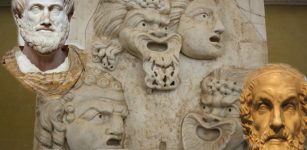 Ancient Suda: Massive Anonymous Byzantine-Greek Lexicon Dated To 10th Century
Featured Stories | Nov 6, 2018
Ancient Suda: Massive Anonymous Byzantine-Greek Lexicon Dated To 10th Century
Featured Stories | Nov 6, 2018 -
 On This Day In History: First US Ship To Trade With China, ‘Empress Of China’ Sails From NY – On Feb 22, 1784
News | Feb 22, 2017
On This Day In History: First US Ship To Trade With China, ‘Empress Of China’ Sails From NY – On Feb 22, 1784
News | Feb 22, 2017 -
 Long-Lost Burial Site Of Viking King Harald Bluetooth Discovered By Satellites?
Archaeology | Jun 29, 2022
Long-Lost Burial Site Of Viking King Harald Bluetooth Discovered By Satellites?
Archaeology | Jun 29, 2022 -
 Geological Mystery Of The Lost Continent Argoland Solved
Earth Changes | Oct 26, 2023
Geological Mystery Of The Lost Continent Argoland Solved
Earth Changes | Oct 26, 2023 -
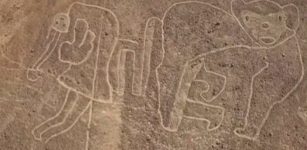 Drones Discover 25 Never-Before-Seen Geoglyphs Near Famous Nazca Lines
Archaeology | Jun 4, 2018
Drones Discover 25 Never-Before-Seen Geoglyphs Near Famous Nazca Lines
Archaeology | Jun 4, 2018 -
 Mysterious Underground City In Brazil Could Re-Write Ancient History – Unexplained Artifacts And Skeletons – Part 1
Ancient Mysteries | Jan 23, 2022
Mysterious Underground City In Brazil Could Re-Write Ancient History – Unexplained Artifacts And Skeletons – Part 1
Ancient Mysteries | Jan 23, 2022 -
 On This Day In History: The Battle of Blore Heath – Sep 23, 1459
News | Sep 23, 2015
On This Day In History: The Battle of Blore Heath – Sep 23, 1459
News | Sep 23, 2015 -
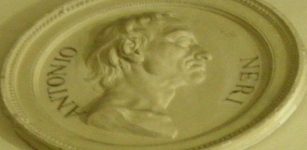 On This Day In History: Antonio Neri Was Born in Florence, Italy – On Feb 29, 1838
On This Day In History | Feb 29, 2020
On This Day In History: Antonio Neri Was Born in Florence, Italy – On Feb 29, 1838
On This Day In History | Feb 29, 2020 -
 Chickens Were Introduced To Britain, Mainland Europe, And Northern Africa Later Than Previously Thought
Archaeology | Jun 13, 2022
Chickens Were Introduced To Britain, Mainland Europe, And Northern Africa Later Than Previously Thought
Archaeology | Jun 13, 2022 -
 Huge, Ancient Underground City Filled With Artifacts Discovered In Mardin, Turkey
Archaeology | Apr 20, 2022
Huge, Ancient Underground City Filled With Artifacts Discovered In Mardin, Turkey
Archaeology | Apr 20, 2022 -
 Pacific God A’a: Fascinating Polynesian Sculpture Designed To Carry A Human Skull And Bones
Archaeology | Apr 9, 2016
Pacific God A’a: Fascinating Polynesian Sculpture Designed To Carry A Human Skull And Bones
Archaeology | Apr 9, 2016 -
 On This Day In History: Franco-Mexican War – Mexico City Captured By French Troops – On June 7, 1863
News | Jun 7, 2016
On This Day In History: Franco-Mexican War – Mexico City Captured By French Troops – On June 7, 1863
News | Jun 7, 2016 -
 Idiots Were Not Allowed To Vote In Ancient Athens
Ancient History Facts | May 30, 2016
Idiots Were Not Allowed To Vote In Ancient Athens
Ancient History Facts | May 30, 2016 -
 Hel – Loki’s Terrible Daughter And Goddess Of The Land Of Dead
Featured Stories | Mar 26, 2018
Hel – Loki’s Terrible Daughter And Goddess Of The Land Of Dead
Featured Stories | Mar 26, 2018 -
 Forbidden Underwater Discovery Could Re-Write Ancient History But The Investigation Was Stopped
Ancient Mysteries | Aug 27, 2019
Forbidden Underwater Discovery Could Re-Write Ancient History But The Investigation Was Stopped
Ancient Mysteries | Aug 27, 2019 -
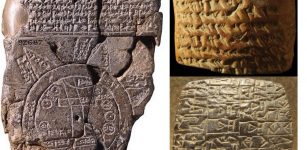 Cuneiform Tablets: One Of The Earliest Systems Of Writing Invented By The Sumerians
Civilizations | May 8, 2017
Cuneiform Tablets: One Of The Earliest Systems Of Writing Invented By The Sumerians
Civilizations | May 8, 2017 -
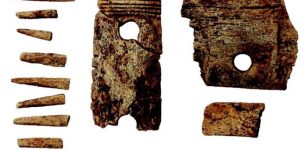 Large Anglo-Saxon Burial With Bodies And Roman Artifacts Found At Bicker Fen, Lincolnshire, UK
Archaeology | Aug 14, 2023
Large Anglo-Saxon Burial With Bodies And Roman Artifacts Found At Bicker Fen, Lincolnshire, UK
Archaeology | Aug 14, 2023 -
 Beautiful Ancient Irish Legend Of The Blessing Of The Bees – Ancient Tradition Revived In Ireland Again
Ancient Traditions And Customs | Oct 11, 2017
Beautiful Ancient Irish Legend Of The Blessing Of The Bees – Ancient Tradition Revived In Ireland Again
Ancient Traditions And Customs | Oct 11, 2017 -
 Major Discovery Of Ancient Roman Temple – Largest Evidence Ever Of The Imperial Cult
Archaeology | Jan 5, 2024
Major Discovery Of Ancient Roman Temple – Largest Evidence Ever Of The Imperial Cult
Archaeology | Jan 5, 2024 -
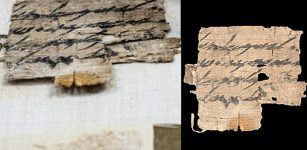 Unique 2700-Year-Old Papyrus With Inscription In Paleo-Hebrew Acquired By Israel From U.S
Archaeology | Sep 7, 2022
Unique 2700-Year-Old Papyrus With Inscription In Paleo-Hebrew Acquired By Israel From U.S
Archaeology | Sep 7, 2022


